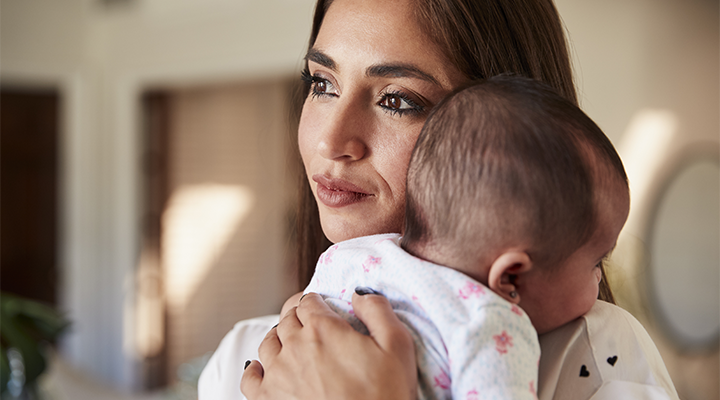Caring for Yourself After Delivery
Whether you had a vaginal birth or C-section, it will take time to recover. It’s important to take care of yourself, go slowly, and contact your doctor with any concerns.

When should I see my doctor?
You should make an appointment to see your doctor two to six weeks after giving birth. During this postpartum visit, your doctor will check in with you to discuss the healing process, baby feedings, possible birth control options, and how you’re feeling mentally. This is a great time to ask your doctor any questions that have come up since you have been home with your baby.
If you have any symptoms that you think are unusual, do not wait for your postpartum appointment. You should call your doctor with your concerns so you can get treatment if needed.
Call your doctor as soon as possible if you experience:
- Very heavy bleeding, like soaking through more than one pad in an hour or noticing large blood clots.
- A red or swollen leg that feels warm or painful when you touch it.
- A bad headache that doesn’t get better after taking medication, or a bad headache that affects your vision.
- A fever of 100.4ºF or higher.
- An incision that isn’t healing.
Call 911 immediately if you experience:
- Chest pain.
- Trouble breathing or shortness of breath.
- Seizures.
Healing after delivery
After giving birth, you will need to restrict your activities and take time to heal. Here are a few ways to make the healing process go as smoothly as possible:
- Rest as much as possible. During your first week at home, just focus on caring for the baby and for yourself. This will help you heal faster and make you less likely to develop depression.
- Take frequent naps and limit visitors so you can relax while you heal.
- Do not exercise until your doctor has given you permission. When you do start exercising, it is best to start slow. During the first six weeks, walking is the best way to get exercise. After that, you can slowly build back up to your normal routine.
- If you had a cesarean section, don’t carry anything heavier than the baby for the first week or two. Use your best judgement and avoid anything that causes you pain.
- For the first six weeks, go on pelvic rest. This means you shouldn’t have sex, use tampons, or douche.
- If you delivered vaginally, you may drive when you feel comfortable and have stopped taking pain medications. If you had a cesarean section, wait at least two weeks before driving.
- Sitz baths (warm, shallow baths), regular baths, and showers are safe after vaginal delivery and can help with discomfort.
Vaginal care
- After delivery, you will experience bleeding and discharge called lochia. It may be any color and often has an odor. This will continue until the uterus has healed, usually four to six weeks.
- If you had a vaginal tear or episiotomy, your vaginal area may be swollen or sore. Urination may cause external stinging, which should resolve after several days. Taking sitz baths or a warm tub bath two to three times a day will help with the discomfort and promote healing. You can use TUCKS (medicated cooling pads) on stitches or hemorrhoids for comfort; they do not require a prescription. The stitches will dissolve on their own and do not need to be removed. Do not worry if you see a stitch or knot fall off.
Diet, bowel, and bladder care
- You can return to your regular diet at home.
- Drink more water than usual and eat lots of fresh fruits and vegetables.
- If you are breastfeeding, increase your diet by 500 calories and be sure to drink eight to 10 glasses of water each day.
- After delivery, you might become constipated. Fiber supplements and stool softeners (Colace) can help, and you can get them without a prescription.
- To prevent a bladder infection, drink plenty of water and pee frequently. If you develop burning or pain when you pee, call your doctor.

Medications
- If you are breastfeeding, continue taking your prenatal vitamin after you give birth.
- Your doctor will give you medications for pain. Take these as directed.
- If you were prescribed iron, it is best to take it with a stool softener.
Postpartum depression
After delivery, your body will go through many changes. It is very normal to feel down or depressed after giving birth. The demands of a new baby and not getting enough sleep can have a big impact on your mental health. For most, these feelings only last four to seven days. It’s important to rest, eat well, and take some time for yourself away from the new baby. Taking care of yourself will help you take better care of your baby.
When to get help
- If this depression lasts longer than a week, seems to be getting worse instead of better, or if you are worried that you may not be able to care for yourself or your baby, ask for help.
- You can call your doctor any time. Your OB should have given you a 24-hour number to call to reach them with questions and concerns. You can also call the MOMS Line 24/7 at 866-364-MOMS (6667) for help at any time.
- If you have thoughts of harming your baby or yourself, you should get immediate help at your local emergency room.
Remember, there is nothing wrong with getting help. Postpartum depression is not a weakness. It is a condition that many women experience and may need medication to improve. Your friends, family, and doctors are all here to help if you are feeling down, and the best thing you can do for you and your baby is ask for help when you need it.
Additional Reading
Going Home With Baby
Here’s what to know about the first few days after coming home from the hospital.
Healthy Partner After Birth
Learn more about how to care for the baby, the mother, and yourself as a parenting partner.
